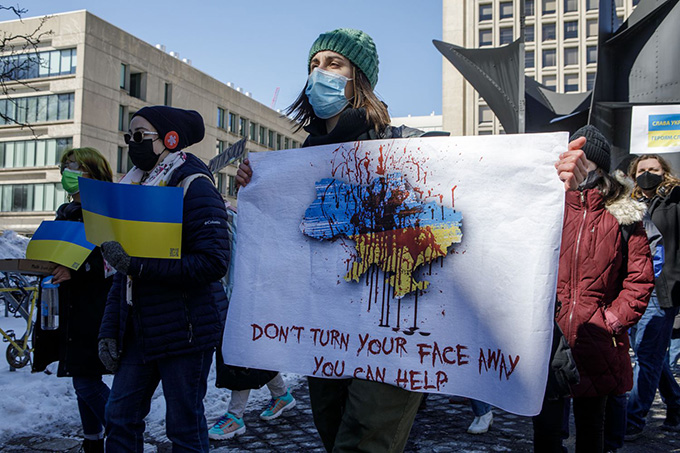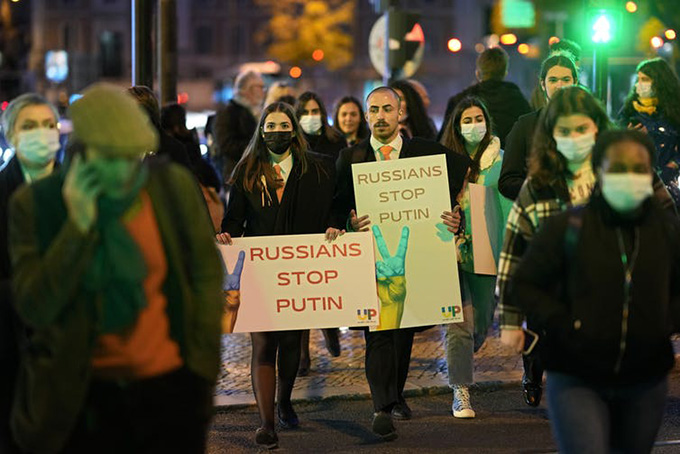 Protests at universities and statements from the International Science Council denouncing Russia’s invasion of Ukraine point to the beginning of a massive refugee crisis — and also raise urgent questions about how the conflict will affect Ukraine’s scholars and research.
Following the Feb. 24 invasion, which has now resulted in more than 1.7 million Ukrainians fleeing the country, Ukraine’s universities and researchers are being seriously affected with the widespread displacement of faculty and students, and a suspension of all activities.
The full extent of the damage on scholars and research will not be known for some time, but predictions are grim.
Our research expertises are in exploring challenges associated with refugee and migrant integration into dominant societies and in intellectual traditions and the rise of populism.
We also advocate with, and for, refugee and displaced scholars fleeing conflict zones or repressive political circumstances, particularly those perceived as threatening to regimes and extremist groups, and who are at risk of being targeted as a result.
One of us, Karly, co-founded the Young Academy of Scotland’s At-Risk Academic and Refugee Membership and is working on the At-Risk and Displaced Academics and Artists program for the Royal Society of Canada’s College of New Scholars, Artists and Scientists. The other, Evren, has first-hand experience with dislocation as a displaced scholar from Turkey, and organizes lectures and panels exploring the challenges displaced scholars face in host countries.
Protests at universities and statements from the International Science Council denouncing Russia’s invasion of Ukraine point to the beginning of a massive refugee crisis — and also raise urgent questions about how the conflict will affect Ukraine’s scholars and research.
Following the Feb. 24 invasion, which has now resulted in more than 1.7 million Ukrainians fleeing the country, Ukraine’s universities and researchers are being seriously affected with the widespread displacement of faculty and students, and a suspension of all activities.
The full extent of the damage on scholars and research will not be known for some time, but predictions are grim.
Our research expertises are in exploring challenges associated with refugee and migrant integration into dominant societies and in intellectual traditions and the rise of populism.
We also advocate with, and for, refugee and displaced scholars fleeing conflict zones or repressive political circumstances, particularly those perceived as threatening to regimes and extremist groups, and who are at risk of being targeted as a result.
One of us, Karly, co-founded the Young Academy of Scotland’s At-Risk Academic and Refugee Membership and is working on the At-Risk and Displaced Academics and Artists program for the Royal Society of Canada’s College of New Scholars, Artists and Scientists. The other, Evren, has first-hand experience with dislocation as a displaced scholar from Turkey, and organizes lectures and panels exploring the challenges displaced scholars face in host countries.
Exile, harassment
Many of Ukraine’s researchers likely face exile, various forms of harassment or worse; a similar fate will likely await Russian colleagues who try to help them. These predictions are based on what has happened before in countries facing war, conflict or political turmoil and strife — including, in recent years, Syria, Venezuela, Hungary, Ethiopia and Turkey. When a war or conflict erupts, educational institutions such as schools and universities are primary military targets. The United Nations Education, Scientific and Cultural Organization (UNESCO) notes that attacking schools and universities enables “extremists to spread fear and indoctrinate new recruits.” Iraq’s Mosul University was targeted by the Islamic State and its library destroyed in 2014. Canada was one of 113 countries to endorse UNESCO’s 2015 Safe Schools Declaration calling on countries to protect schools and universities from military use during armed conflict. Universities are also subjected to intellectual dismantling. At the extreme, in countries like Syria, this occurs through the targeted harassment, kidnapping or even murder of professors, researchers and students whose work is perceived as being at odds with the messaging of the regime or authoritarian government. Numerous women and LGBTQ+ researchers from various countries have told us they feel vulnerable to acts of violence and segregation because of their sex or how they identify or because of their research in the fields of LGBTQ+ or women’s rights. The International Science Council notes that early-career researchers without well-established networks often find themselves in highly precarious situations when conflicts erupt.Armed conflict, academic censorship
Being able to criticize government policy, to research subjects that are controversial or critical of an authoritarian government — or to advocate in fields like women’s health — is not a freedom that all academics and students possess. As the Scholars at Risk Academic Freedom Monitoring Project shows, researcher displacement through war, conflict and targeted violence is a persistent, longstanding issue. Sample data collected from September 2020 to August 2021 identified 332 attacks from 272 verified incidents in 65 countries — a “small subset of all attacks on higher education.” The consequences of these kinds of systemic attacks, due to armed conflict and academic censorship within countries, are severe because not only is immense human capital lost, but global research capacity is undermined. Academic censorship often targets individual researchers whose political beliefs, activism or research does not align with the narrative that the regime or authoritarian government wishes to advance.
University students carry posters reading ‘Russians Stop Putin’ after attending a demonstration outside the British Embassy in Lisbon, in solidarity with the Ukrainians, on March 4. (AP Photo/Armando Franca)
Crisis flashpoints
Credible estimates suggest there are at least 10,000 displaced scientists worldwide, but the number is likely much higher. When a crisis hits, countless people end up internally displaced or in bordering countries. In the past decade, some of the major flashpoints have been Syria, Turkey, Yemen and Venezuela. Ukraine is experiencing a similar mass displacement now, as many of its citizens seek refuge in other parts of the country or in neighbouring countries such as Poland, Slovakia and Hungary.Safe spaces for persecuted scholars
Some scholars fleeing conflict also end up in Canada. The Government of Canada and Canadian academia needs a shared commitment to recognizing research — all disciplines — as a universal undertaking, and to providing safe spaces for persecuted scholars to continue their work. We are aware of numerous initiatives where some Canadian universities independently or in partnership with NGOs, provide support to displaced researchers through lectureships, visiting professorships, lab assistant roles or postdoctoral fellowships. The support is short term, usually for one, two or three years.As far as we are aware, there is no systemic research documenting these initiatives across Canada. While this kind of support is essential, long-term structures recognizing the various needs of scholars at risk are needed — both in their home countries and in host countries. Both Canada and academics in particular need to do more now because our colleagues in Ukraine, Syria, Yemen, Venezuela, Turkey, Ethiopia and many other countries are having, or have had, their academic freedom and rights to research stolen from them, with grave consequences for all of us. It is essential that Canadians recognize that the Canadian research enterprise extends far beyond our own borders and we have a responsibility to make space for scholars at risk.SNSF strongly condemns the Russian invasion of #Ukraine and will support researchers affected by the war. This includes supporting stays by Ukrainian researchers at Swiss higher education institutions via #ScholarsAtRisk.https://t.co/tF9GmS4MHl
— Swiss National Science Foundation (@snsf_ch) March 1, 2022